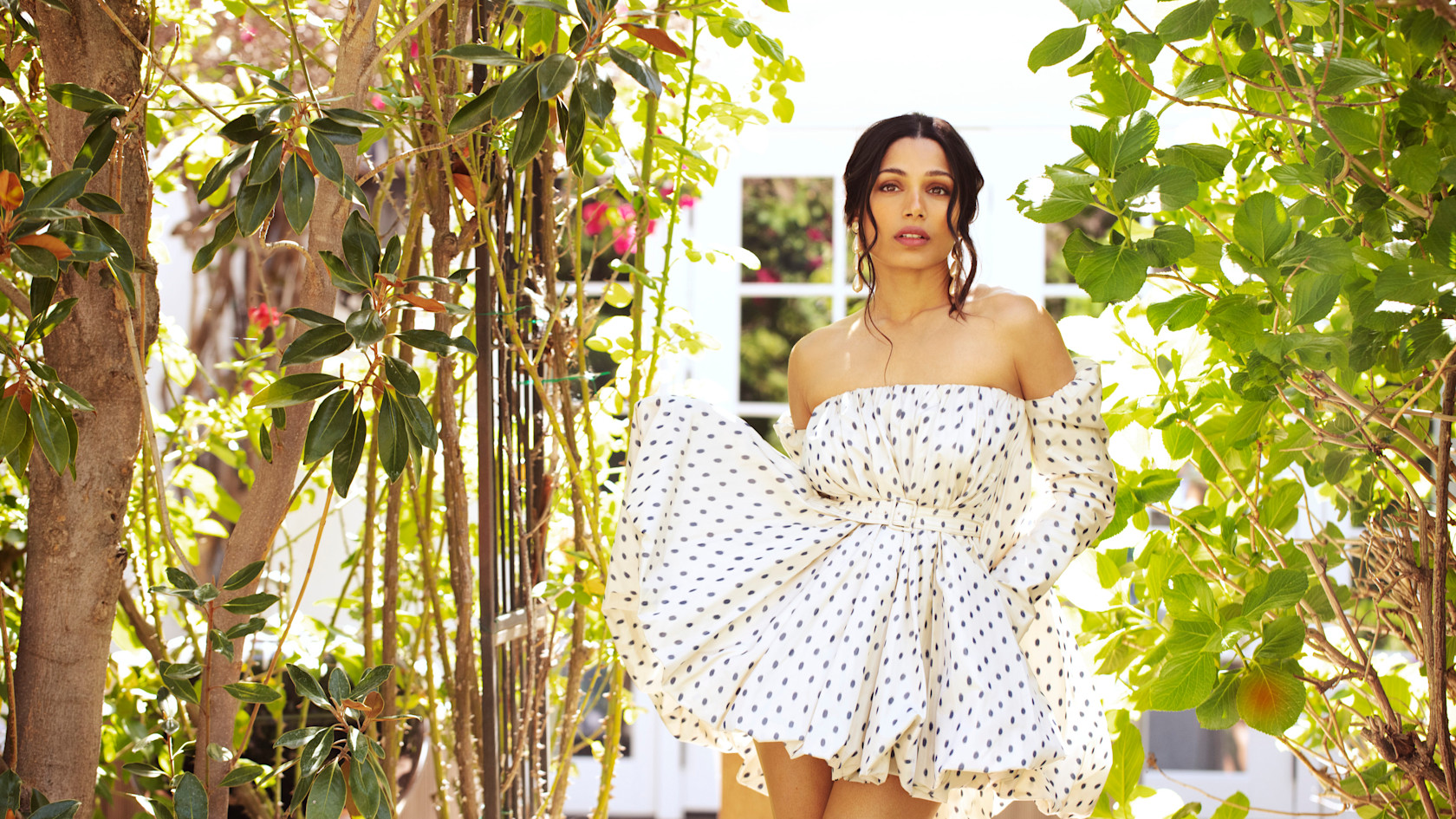
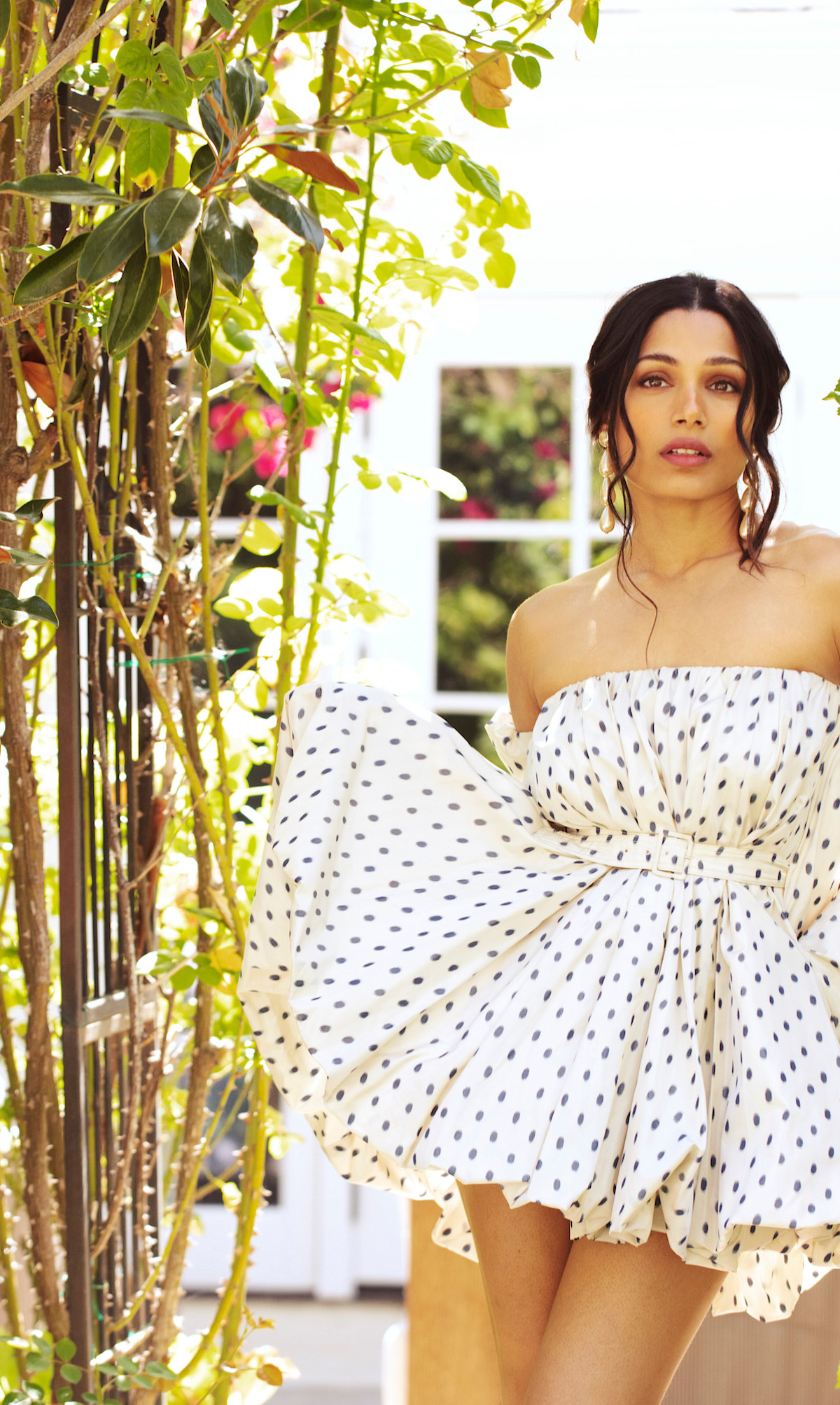


FREIDA PINTO
Fiercely Focused
Actor, Activist, And Producer Freida Pinto Returns To The Screen This Summer Carrying With Her A Sharp Vision For Her Vocation
PHOTOS BY MATT SAYLES WORDS BY TAMARA RAPPA
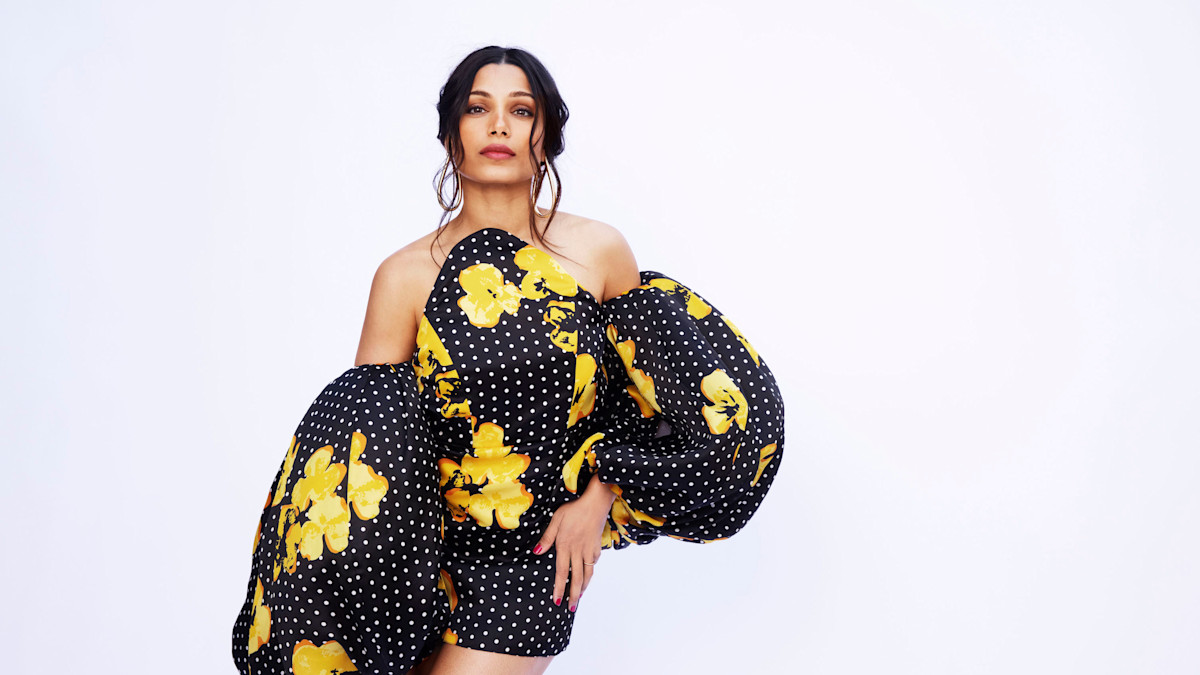
ABOVE PHOTO: One/Of Dress; Florian Earrings. THIS PHOTO: Carolina Herrera Dress; Jennifer Fisher Earrings.
Listen to the extended interview on episode 106 of the Story + Rain Talks podcast on Apple Podcasts, Spotify, or wherever you listen.
Tamara Rappa: Growing up in India, when was it exactly that the urge to become an actress started surfacing. Can you tie this to a particular moment?
Freida Pinto: I remember very clearly. It was 1994 when Sushmita Sen won Miss Universe. I must have been 12 or 13 years old, and I remember, for the very first time, recognizing a young Indian woman being celebrated on an international platform, being respected for her grace, her intelligence, her beauty---all of it. I don't know if I'm thinking about it more deeply now, or if I thought of it as deeply then, but I do believe as children, an impression that forms pretty early on can be a pretty powerful impression, a powerful way of pivoting towards what you might want to see your future becoming. I don't think I really wanted to be a pageant girl, but I do remember telling my parents that whatever I do, I want to be celebrated on a world platform. I don't know how that idea even came to me, but it was a very clear idea that I wanted to do something international, from a very young age. It was not really the fame or the glamor that drew me to it---It was seeing how everyone knew Sushmita's name. That made me feel like okay, that's respect; that's recognition. That was definitely a manifestation I might have created from very early on. As I continued through school and college, I found myself naturally drawn to the extracurricular things. I was drawn to drama and theater. It was, of course, amateur theater, but nonetheless, it was stuff I really enjoyed doing. I would write my own plays and direct them. That's kind of a road I'm hoping to go down now. Not writing, but definitely directing. Now that I have a child of my own, I'm noticing that so much of who we become, we see glimpses of in our childhood. There are glimmers. The organizer in me has translated into the producer in me. There are many other things I can recognize from my childhood personality that have seeped into my adult personality.
TR: You recently had a baby, Rumi, whom I met while shooting our cover story at your lovely home. Parents and new parents often talk about how having children really shifts perspective. How has Rumi shifted your thinking, your way of being, your perspective as an actor, or as a creative?
"Now that I have a child of my own, I'm noticing that so much of who we become, we see glimpses of in our childhood."
FP: What I'm noticing I'm doing with Rumi, is being more observant and still, and really letting him show me---as opposed to me always guiding him. I'm letting him show me what he wants to do and how he wants to express himself. He's just seven months, but gosh, they're so intelligent already at seven months. They're so resourceful. Of course, they don't have control over their impulses, and they're too little for logical thinking, but he already has a style of communicating. If I let him be, I believe I will understand him better. He's showing me pretty early on, or rather teaching me very early on, to stay still and be observant. I think that's what my parents did with me, in many ways. They always reminded me, even as a child, that whatever my passion was, I was completely free to chase it, completely free, completely open to making it happen for myself. What I'm really noticing with children is that they always show you who they will become, very early on.
TR: Has Rumi affected your work in any way, in terms of how you approach it?
FP: I have my own production company, so I pretty much know, on a creative level, what kinds of projects I want to engage in, both in terms of creativity and in terms of the kind of roles I want to play. It's very clear to me. On a practical level, in terms of scheduling, Rumi takes priority. I do really want to enjoy this first year of motherhood. It's already been seven months, and it feels like it's just flown by, I constantly see this child growing too quickly. Every minute I look away, there's something new that's happening, and I literally don't want to miss a thing. This first year, it's all about taking on projects that don't take me away from him for too long, and projects that allow him to be with me through most of it.
TR: Do you share your skill for acting with anyone in your family, or is anyone else in your family artistic?
"It's a tough industry. It's great when it's great. It's horrible when it's horrible. The lows are low, and the highs are high. You've really got to have a good head on your shoulders to stay grounded through it all."
FP: Yes. We have a lot of artistic people in my family, but no one in the film industry or the acting world, not even in the producing world. I'm the first, but I do hear from my cousins that their children want to follow in my footsteps. Sometimes I'm like, 'hmm, do I want to encourage this?!'
TR: They'll get great advice from you, that's for sure.
FP: Oh my God. I don't know. I mean, it's a tough industry. It's great when it's great. It's horrible when it's horrible. The lows are low, and the highs are high. You've really got to have a good head on your shoulders to stay grounded through it all. I'm the first and hopefully won't be the last.
TR: How did you choose what to study in college? What was the thought process behind what you would study?
FP: That's a very good question. No one's asked me that question quite like that, because everyone assumes you pick a certain subject for the love of it. But what do you do when you are more inclined towards the extracurricular?
"Funnily enough, and this is no disrespect to the modeling world, the thing I always remember about modeling, was how much I didn't like it."
TR: I wanted to work in fashion, but I studied English Literature and I minored in French and Russian.
FP: ...And there must have been a reason why you did it in that particular way. Very much so, I had my reason too. There was a film and literature class, just one part of the course, but it was the only one I looked forward to. I enjoyed studying Renaissance literature, all of the various literature among the various periods, American literature, and Indian literature. All of it was fun, but really what I was most drawn to, was the film and literature class. That was one of the main reasons why I took on English literature; it was the closest I could get to film. Psychology and economics were my minors. I think I took those on because my sister took them on. I enjoy psychology, but I can't imagine having graduated in psychology, and it's too much studying for me.

One/Of Dress; Florian Earrings; Mia Becar Shoes.
TR: You've spent some time focusing on modeling. What do you recall most about modeling? Was there a job or a moment you loved, or any you hated?
FP: Funnily enough, and this is no disrespect to the modeling world, the thing I always remember about modeling, was how much I didn't like it. I was always very opinionated, I always had something to say, I quite frankly wanted to be heard, but time and again, when I had a suggestion as a model and I would present it, I was told that I was just a model. So I just had to shut up and do my job. Just pose, just smile. That really frustrated me. I modeled for about a year or something, and thought, I can't see myself going any further with this. It made me feel a little underused, and not so smart---even though models can be so smart and highly educated and can strike up great conversations. For some reason, when I started off, I wasn't allowed that space. And so I was quickly looking for a pivot. I really wanted to act, but quite frankly, Bollywood was already such an established industry with established names, and I had to know someone in order to get somewhere. I knew nobody. And my sensibility was always kind of the art cinema of India, in which there wasn't really much happening. So I waited for a sign that said, 'this is what you're going to do next.' And the very next thing that happened was I traveled all of Southeast Asia as a travel show host, which was so fun. I got to act, I got to have an opinion, and I got to learn. I asked impromptu questions, I was asked questions, and I was expected to give good answers to them. It was a good blend, a good stepping stone towards what I would do next. It also opened my mind because it took me all over the world; it really broadened my horizons and made me respect and understand other cultures, and actually want to explore more. When you're acting, you have to go in and out of so many different characters and roles. It's such a good exercise in fully immersing yourself. The frustrating part of modeling pushed me to go and find something else for myself.
"I truly enjoy my craft so much because it's constantly throwing new challenges at me. It's never the same. It's never boring. It's never dull."
TR: And when you did that, did you find that coming from this background in modeling, you had to deal with fighting to be taken seriously as an actor?
FP: I used to get frustrated whenever they'd go, 'Freida Pinto; model, actress.' I'm not modeling anymore! Over time, I've understood that as an actor, sometimes you're modeling too. You're modeling a brand or a product; your character could be an extension of the branding world. I get why they would use that term for me, and I didn't have that frustration when I got into acting, because my very first film was with such a brilliant director who I was dying to learn from, and who would teach but also give me the space to explore on my own what I would do with my character. It was so liberating and so daunting at the same time, because it was my first project ever. But I have to say that since then, I've had very high standards for myself.
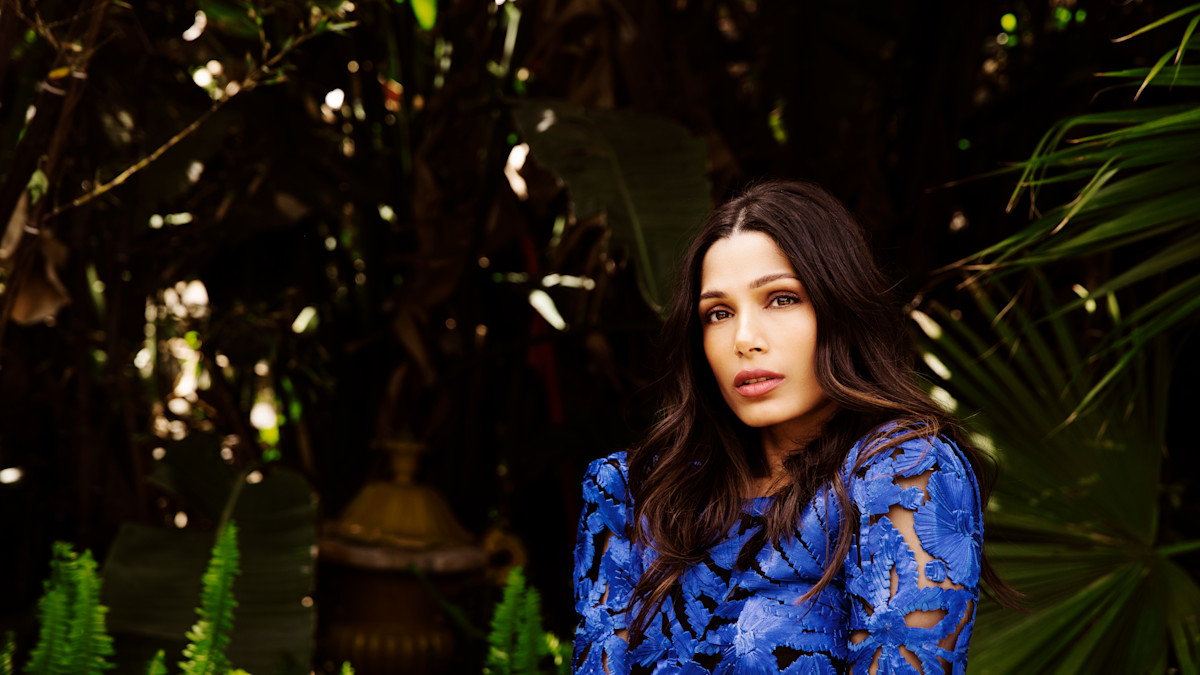
Naeem Khan Dress.
TR: How could you not? Slumdog Millionaire, what an amazing first experience.
FP: Yes. I'd always wanted that level of directing from my director and that level of genius from the screenwriter. The expectations were really high. I got spoiled, for lack of a better word, in a good way.
TR: Your husband, Cory, is a photographer. What do you love about being part of a creative couple?
"Women's health, specifically reproductive health and women's well-being in general, have always been of great importance to me."
FP: That's a good question. Cory is a blend. People have seen his photography and his creative side of things, but he's also very much a producer, also a very creative art. You've got to be creative when you're producing. He's also really good with business and real estate. And I think what works really well for us, as a couple, is that we are both very diverse in our interests. That makes the relationship a lot more fun, because we get to learn from each other all the time. Would I do the things that he's doing? And would he ever act? Never. I hate numbers and anything to do with finance, and we always say that our partnership benefits from the two of us filling the gaps we don't want to fill in our own lives. We want someone else to do that part for us, and we want to be supported in that part. That's how I see the creativity in our relationship really working for us.
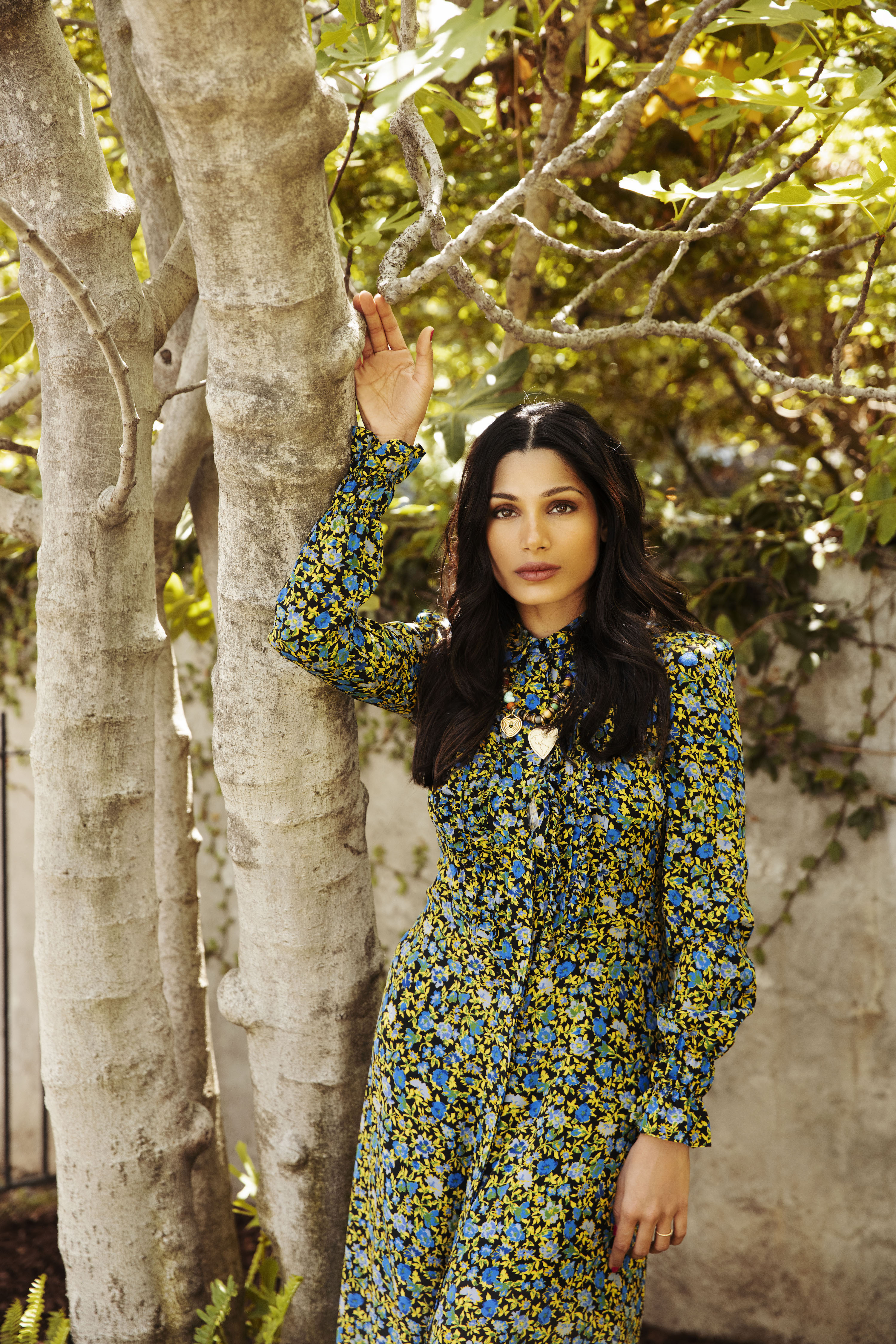
Victoria Beckham at Bergdorf Goodman Dress; Have A Heart x MUSE necklace with Christina Alexiou, Elena Votsi, and Fernando Jorge Charms on a Don't Let Disco necklace.
TR: Tell me a little bit about your work with Anya.
FP: Anya came into my life when I was five months pregnant. Women's health, specifically reproductive health and women's well-being in general, has always been of great importance to me. We all put so much focus on the pregnancy months and the first trimester and the second trimester. And while you're in your pregnant months, there is so much focus on the newborn. You've got to buy the clothes, you've got to buy the crib, the rocker... There are like six hundred things you'll never use, but you end up buying them all. The one thing that always gets forgotten, at least in America and definitely not the case in India, is the postpartum period and how intense and crucial and kind of wild it can be. If you aren't prepared for it, it can really hit you like a ton of bricks, and make you spiral down a path you least expected. Preparation for me was very key because back home in India, there is so much focus on the postpartum period. Women are literally taken into their mother's household and taken care of for the first forty days. They don't do anything. It's all about caring for the mother and caring for the newborn. There are family members or someone who is very good with baby massages and mother massages. My mom had that for both of her babies. I was in Austin, knowing that I couldn't go back to India. Quite frankly, I wanted to have my baby in Austin, so I needed to prepare my own postpartum sanctuary. While I was in the process of putting it all together, a friend of mine told me about Jane [Baecher] and Ariana [Saunders] and their company Anya, and that they were looking for a partnership to take the messaging of the postpartum period, across the nation and help it achieve scale. It felt like such a natural fit, because I was already in the process, I was doing it so organically already, I'd experience a lot of things in real time, and I'd be able to share things in real time, so we recorded a bunch of things. Breastfeeding was really tough for me in the first couple of months. We've done a couple of Q+A's to normalize talking about the stuff that's not easy in the postpartum period. Relationships are definitely one of them as well. A big topic for me and for anyone who's had a child, is that the first thing you hit a real wall with is communication with your partner, how you communicate with your partner, and the sleep deprivation that makes that communication that much harder. Tackling all of that is just another thing in the sea of things you've got to tackle in your postpartum period. So we are really hoping that we can not just send out the message to the women who need it, but send it out to their families and ultimately, hopefully, the government. First and foremost, our focus is getting support out to women when they need it the most, not having them have to do 3 am Google searches, and come up with six hundred different answers, not knowing which to go with, because all of them contradict.
"I love meeting new people, and not just actors and directors and writers. I'm talking about crew as well. You always find gems everywhere you go."
TR: What do you enjoy most about your craft and how does it feed you as an artist?
FP: I truly enjoy my craft so much because it's constantly throwing new challenges at me. It's never the same. It's never boring. It's never dull. I get to embody different characters all the time. The preparation act of getting into the skin of that character, fully understanding her, you have the jitters because you're kind of like, 'Oh my God, I'm going to be able to bring this to life. I know her enough to bring her to life.' I'm completely freaked out by it, but I also crave it at the same time. It's the butterflies in your tummy because it's such unknown territory until you've done it. And that's a difference between theater and film, and film and TV, because you do your own prep in your room. I'm so happy when there are rehearsals, because you really get a chance to practice it a little bit, and most of the time there isn't the time to go really deep and rehearse. In theater, you're rehearsing for so many days, months even, before you can take your craft to the stage. It's so different with film and TV. The nervousness is what always gets me excited and, like I said, also terrifies me sometimes, because I think, 'Do I even know what I am doing?' As you start doing it, as you start exploring it bit by bit, you realize how many layers there are. And that gets me really excited, to constantly explore the nuances and layers of the characters I embody. First and foremost, it's the thing that excites me the most. The second thing, will always be the people I work with. I love meeting new people, and not just actors and directors and writers. I'm talking about crew as well. You always find gems everywhere you go. In the acting world, we're passing ships. We get to a project, and we really bond, because you have to sometimes. Sometimes you don't really bond. Sometimes you're working with a nightmare, and you just want to get off of the project. But most of the time, 99% of the time, I've been very lucky. I end up bonding with cast and crew, and then move on to the next one. There will be a few people you take with you, sometimes there will be none, and sometimes there will be many. You never know what you're getting.

Carolina Herrera Dress; Jennifer Fisher Earrings.
TR: Is there anyone you've worked with over the years who has made a truly lasting impression on you, in terms of the way that they approached their craft or their work ethic?
"Josh [Brolin] really helped me relax. He gave me some really good golden nuggets of advice that I still remember today. The main thing I remember him saying, is to just loosen up. Shake it all off, stop thinking about everything."
FP: Quite a few, actually. Top of my head, the first name I remember because I was so young when I did that movie, is Josh Brolin. I did this movie called You Will Meet A Tall Dark Stranger and he was my co-star. Josh Brolin is so established as an actor, and here I was, a complete newbie. I don't freaking know what I'm doing, and I'm just standing there being all kinds of nervous.
TR: Hi, I'm on a Woody Allen film.
FP: Exactly. It was only my third film, and here I am, on a Woody Allen film set. Josh really helped me relax. He gave me some really good golden nuggets of advice that I still remember today. The main thing I remember him saying, is to just loosen up. Shake it all off, stop thinking about everything. He's just such a brilliant actor. I was so lucky he was my co-star on that particular one. And then I'll tell you a little fun story on that project, about Sir Anthony Hopkins. He's obviously a legend, and I didn't have any scenes with him, but I knew he was in the trailer one particular day, and wanted to go meet him. I'd heard from the AD that he wanted to meet me too.
TR: How lovely.
"I tell him, 'I'm so nervous. It's my first day. I hear actors get fired on a Woody Allen [movie] when they don't do their job well.' And then Sir Anthony Hopkins says to me, 'I have the same fear. I'm so nervous. I don't know what I'm doing either. It's just my second day, and I could be going home tomorrow.'"
FP: I know. And how very kind. So we end up meeting, and I tell him, 'I'm so nervous. It's my first day. I hear actors get fired on a Woody Allen [movie] they don't do their job well.' And then Sir Anthony Hopkins says to me, 'I have the same fear. I'm so nervous. I don't know what I'm doing either. It's just my second day, and I could be going home tomorrow if I'm not doing it right.'...I'm like, uh, hello, what?! And I think he was being sincere because of the way he said it. I looked at him, and thought, of course he's joking. He's just saying this to make me feel better. But he was actually being serious; that's how he felt. It made me realize that no matter how established you are, no matter how much experience you have, it is okay for you to feel nervous on your first day.
TR: Nervousness can be a sign of integrity, a sign that it's something you care about. It's not necessarily a bad thing to be nervous.
FP: Absolutely. And it's a sign of true professionalism as well, a sign that you've really come in prepared. You do the work and you leave a little bit of room for surprises and excitement and instinct. I believe that some of the best actors do all the preparation that they have to do, and then always leave a little room for magic.
"The crazy story is that the film was going straight to DVD; it wasn't even going to have an international release. I think it was at the eleventh hour that Fox Searchlight and Peter Rice jumped in and took on the project. If not for all that, about fifty people would've watched the movie!"
TR: Slumdog Millionaire was quite a phenomenon in 2008. It was all anyone was talking about. You were recognized with a BAFTA nomination, there were MTV and Teen Choice nominations, and you won a Palm Springs International Film Festival award. The cast won a SAG award. When you were working on it, did you feel how special all of it was?
FP: What felt special about the film, was really the people. This goes back to your question about the things that make me most excited about working in film and TV, to this day. It was so special because everyone on the project was absolutely lovely and talented, and they made all the newcomers feel supported. They perked us up all the time, and made sure that we knew what we were doing. We never felt like fish out of water or lost. That kind of cocooning of warmth that we felt was the most special thing about the film. Now, the success of the film received? The crazy story is that the film was going straight to DVD; it wasn't even going to have an international release. I think it was at the eleventh hour that Fox Searchlight and Peter Rice jumped in and took on the project. If not for all that, about fifty people would've watched the movie!
TR: Why do you think the film was the success that it was, in thinking about it years later?
"Story is king in order to make anything a success, and that's exactly what I feel Slumdog Millionaire had going for it."
FP: A couple of things. First of all, there was a lot of sincerity that went into the project, in the sense that, yes, it was a story that was fictionalized---not a true story in any way---but the emotions behind it all were sincere about this young kid, his underdog story, everything he went through. The only thing that mattered to him, at the end of the day, was the love of his life. Not the money, not the fame, not the glamor, but just the love of his life. The sincerity in which that story was told is what really resonated with people. Then, I feel like the timing of the film was also perfect. The world was going through the economic crash, and it was a bad year for a lot of people, financially. We all needed a little bit of an uplifting moment. We all needed to feel that in the end, there will be that silver lining. The film provided that hope in many ways. And then, of course, Mumbai, the city I grew up in, played such an important role in opening people's eyes to this other culture, to another world, in the same way Parasite and Minari did. I think in so many ways, we tend to undermine films from other cultures, or actors that don't really mean something to the world. We always think it has to be the same people, in the English language, because that's the only way you can reach people. It's quite false; because a good story, is a good story. Story is king in order to make anything a success, and that's exactly what I feel Slumdog Millionaire had going for it; it's a very solid, fun, entertaining, emotional story.
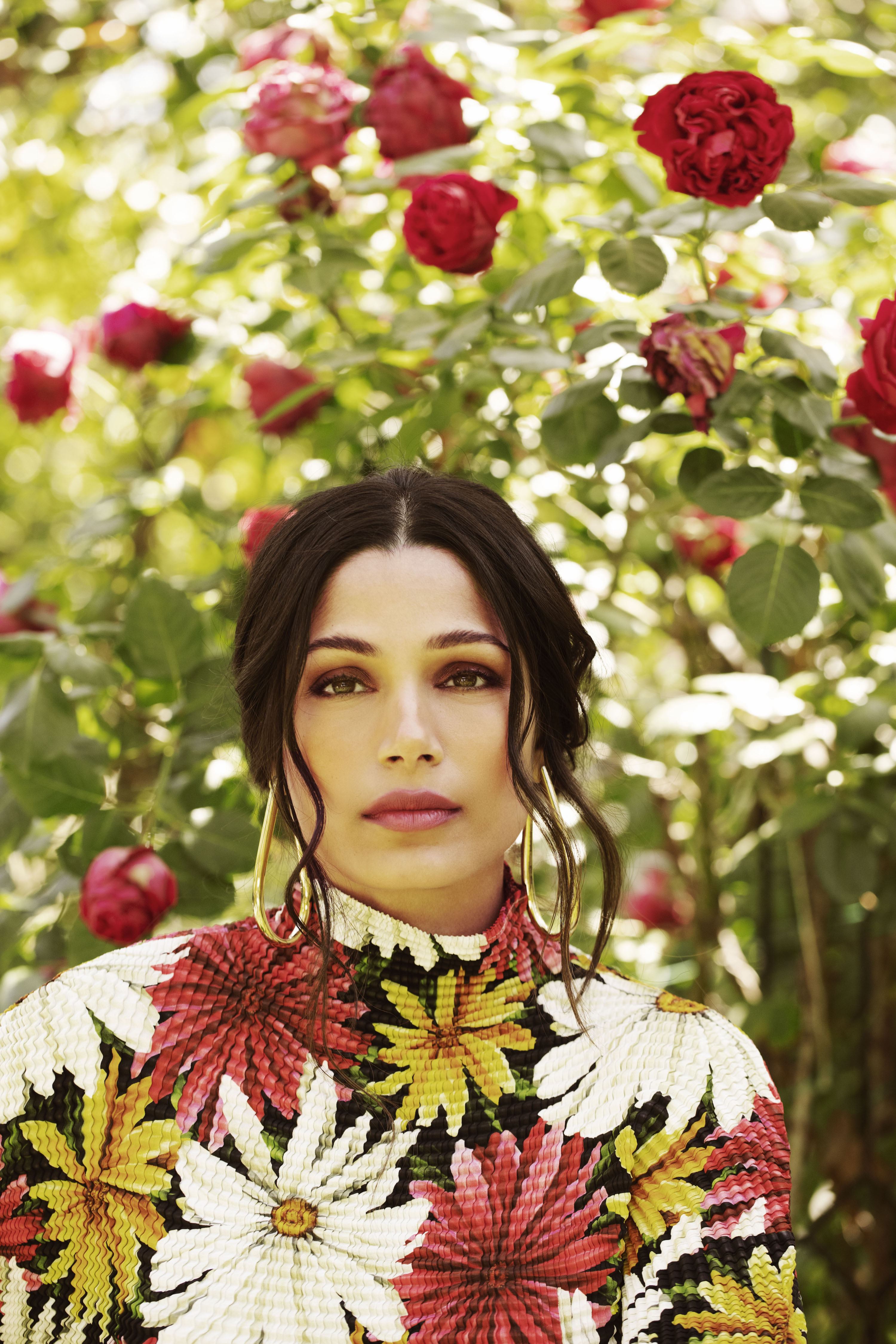
ETRO Top; Jennifer Fisher Earrings.
TR: You had a very extensive audition process for the film; it lasted six months. How did you grow as an actor at that time, and what did you take away with you, from the audition process and from working with Danny Boyle?
"In working with Danny Boyle and casting director Loveleen Tandon, who is absolutely fantastic, I was placed into their school of acting, so to speak. The thing I learned from both, and specifically Danny, was to keep my instincts sharp."
FP: In working with Danny Boyle and casting director Loveleen Tandon, who is absolutely fantastic, I was placed into their school of acting, so to speak. I had never been to a formal acting school or done any formal acting courses, so it was like being baptized by fire. With the best people out there, you learn from them, and the thing I learned from both, and specifically Danny, was to keep my instincts sharp. We all have our instincts, and a lot of us will second guess it. You think you have to act, when sometimes you have to flow and just be in it. It's an uncertainty---you don't know where it's ending, you don't know where it's landing, but you just go with it. That rush of doing things that way is really Danny's style. I'm so glad I got to do it for six months in the audition process, so I could learn, and take it into the filming process. And then take that experience further, into everything else I'd do after it. And the other thing it taught me, is to always take on every project as if it were my first. It taught me to always have the same level of preparation, the same level of dedication and commitment, and no slacking, on every project.
TR: You've worked with a number of visionary directors. Danny Boyle on Slumdog Millionaire; Woody Allen; Julian Schnabel; Terrence Malick, and Ron Howard, whom you worked with on Hillbilly Elegy. How do you characterize some of these directors whom you've worked with, in terms of their creative process? What did you observe about each?
"The way that Woody Allen tells his stories is very particular. Watching him and watching all of the co-stars in the film play it in a certain way made me realize, 'Oh, this is the style.' There is a lot of nervousness; there is a lot of fumbling around words. That's how he writes his scripts too."
FP: Julian Schnabel was the second director I ever worked with, and a fun story about that, is that it was Danny Boyle who put me on tape for that film. I needed to audition for it, and we were busy promoting Slumdog Millionaire, so Danny came to my hotel room to help me put myself on tape. What an amazing director, to have done that. It was really sweet. Julian was the second director that I worked with, and of course, he's an artist himself. That seeps into the way he directs. He saw every frame as if he saw a painting. The way he would direct and the way he would give notes was pretty much along the same line; it was almost abstract at times. You just had to trust it and go with it, and you knew you would arrive at something beautiful. What I learned from that project was surrender. With Terrence Malick, I also learned surrender. The way that Woody Allen tells his stories is very particular. Watching him and watching all of the co-stars in the film play it in a certain way made me realize, 'Oh, this is the style.' It's kind of fun going along for the ride in terms of that style of performance, as well. There is a lot of nervousness; there is a lot of fumbling around words. That's how he writes his scripts too. Ron Howard, oh my God, what a brilliant human and a brilliant director. He's an actor himself, so the notes he would give really came from the perspective of an actor. And of course he's been directing forever, directed some of the best and some of my favorite films out there. In fact, the year we were promoting Slumdog Millionaire, he made Frost/Nixon. I remember loving that film so much and thinking to myself, 'I don't know if you stand a chance. I mean, look at the actors in that film.' With Ron, it was about trusting him and surrendering, again, to his style of directing. Every director I've worked with has a very distinctive style.
"Julian [Schnabel] was the second director that I worked with, and of course, he's an artist himself. That seeps into the way he directs. He saw every frame as if he saw a painting."
TR: How do you prepare yourself for your work? Yes, there's the research, but are there any practices and rituals that help you tune in? What needs to be happening for you, from a lifestyle perspective or a process perspective, when it's time to dig into a project?
FP: It's pretty simple for me. I have to really know my script. If I'm doing a dialect, I have to have had enough time practicing it with my dialect coach, making it feel like second nature, so that I'm not stressed out about it, not nervous or conscious of it. The thing I love doing the most is preparing a playlist, especially if the character's very intense. I love listening to music. If it's not a playlist, then it's really important the costume and the hairstyle, and anything I'm doing for a certain character, is different from what I would do in everyday life. I don't want it to be an extension of me. Otherwise it's a little confusing. I always try to add one little thing, something that maybe the audience won't see, but something I do for myself. One little tweak to kind of help me get to the mindset faster. Then, I prepare my environment for success. I try to go to bed early if I have an early morning call time, I try to eat healthy while I'm filming because, inevitably, by week three or four, I'm eating all the junk at craft services. When it comes to my health, I try to prepare for success---even before we start filming.
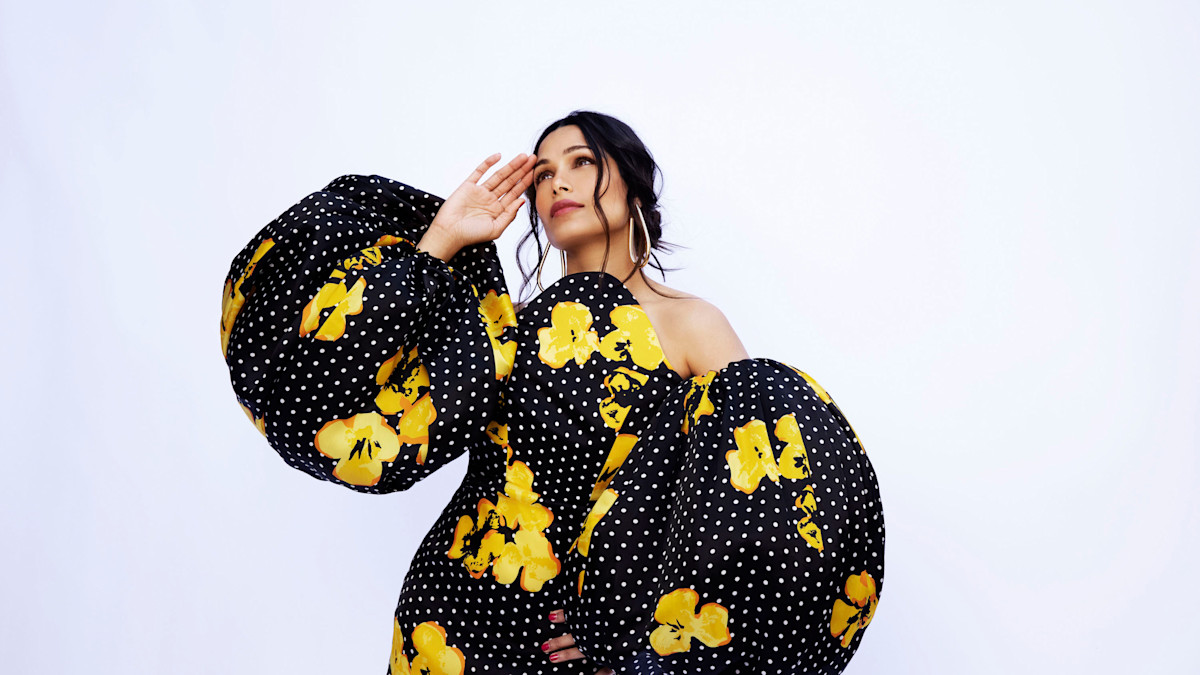
Carolina Herrera Dress; Jennifer Fisher Earrings.
TR: After you immerse yourself in the research process, in learning about a character you will play, how do you then shake it off? Is it difficult to tune out?
"I love playing characters that are not in any way similar to who I am, but Trishna's character was so painfully submissive, it made me really struggle, coming out of it. That experience informed my future choices and the characters I want to play."
FP: I think the hardest role to shake off was Trishna. When I did Trishna, it was too intense. I love playing characters that are not in any way similar to who I am, but Trishna's character was so painfully submissive, it made me really struggle, coming out of it. That experience informed my future choices and the characters I want to play. I don't mind playing someone who's submitted to a certain degree, but not the whole way. I realized it's not something I want to put out there, as a message to women. It was a very tough one. The harsh truth is that characters like Trishna exist. In fact, I've met them, the exact same women. I met them all over Rajasthan when I was doing my research, and I know they exist all over the world. I know they exist in America. I know they exist everywhere. I want those women to feel seen, and I want them to have hope. The characters that I take on now, have to angle towards hope in the end. With all of my characters from now on, that is what I want to play. Another intense role I played, but had so much fun playing, was Jas Mitra from Guerrilla. I was exhausted, but I was like, 'Give me more.' It was almost like a drug. It was intense, because she was radical and desperate to prove herself in a man's world by taking charge in ways that were not expected of her. That character drained me, but in a good way. It constantly kept filling me up with more, and more, and more---every single day on set. It's probably one of my favorite characters I've played, ever.
TR: Do you have a most extraordinary experience in all that you've experienced in your work? When you think of what you've done so far, has anything stopped you in your tracks, made you pause and take it all in?
"The thing I love doing the most is preparing a playlist, especially if the character's very intense. I love listening to music."
FP: All of it. I always say it's a miracle that I even get to work in a highly competitive industry, where we are replaced in the blink of an eye, where we try so hard to be good. The only thing we can do is be really good at what we do, but we can't control so much of the other elements that go into it. We can't control the success of a film. We can't control where it lands. We can't control how it's marketed. Yes, you can to a certain degree, but you can't control how people think of it, even if you put millions of dollars into marketing. So I just think it's a miracle that I'm even working, and very grateful for it.
TR: How important are your surroundings as a creative, and where do you feel most inspired? I'm interested in your perspective, as someone who has planted roots in LA, India, and London.
FP: I feel inspired in all three, because I've lived in all three in equal measure. I love the English accent the most. Whenever I have to do a full RP, I'm just like, 'Give it to me!' I love working hard and getting it right, nailing it. The American accent is possibly the hardest, but nonetheless, I've done it before and will be doing it in the future. It requires a lot more practice. The Indian accent is in me. It's very easy for me to do it, and I know exactly how far not to go, to keep it from being gimmicky. The stories I feel are lacking right now are the Indian-American stories, the Indian stories, and the British-Indian stories. For me, those are the stories that aren't present in full force the way I would like, they are not present in the way that other stories are. However, that change is happening. We can see it happening with Bridgeton. We can see it happening with Ms. Marvel. I just watched the first episode yesterday, and was so excited for my friend Sharmeen Obaid-Chinoy, for the cast of that film, and for every creative person that came on board to make that happen. And, of course, to the triad at Marvel who had the courage to make it happen. Mindy Kaling is constantly doing it in comedy. I feel like that moment is here now, and specifically here, for women. I think it's been there for men for a while, and now it's finally here for women. Since I feel most inspired playing characters I've never been played before, inspiration could come from any part of the world.
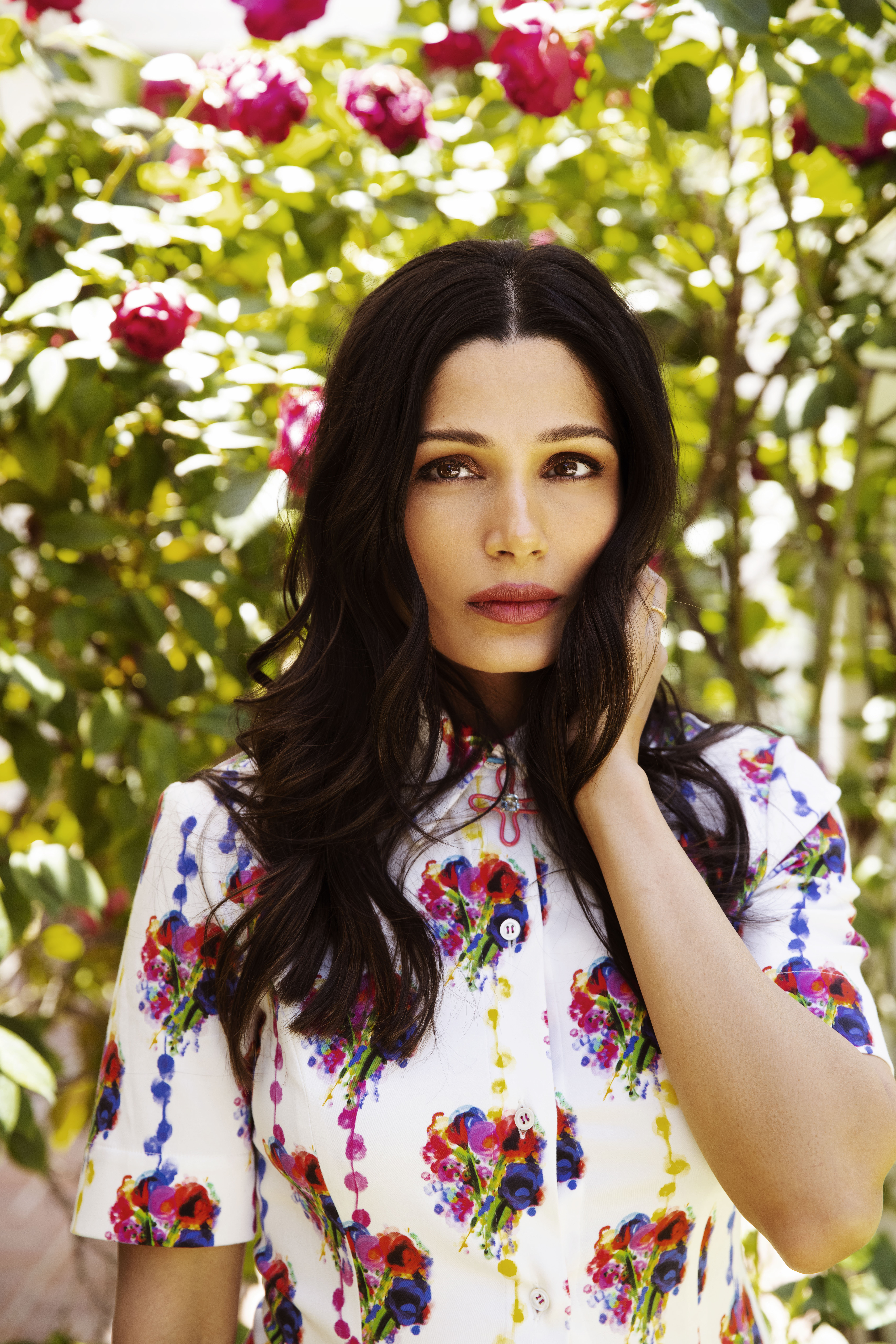
Jonathan Cohen Dress; Bea Bongiasca Necklace.
TR: Freebird Films, your production company, will be tackling stories like these?
FP: One hundred percent. We are well on our way, and about to make some big moves.
"I always say it's a miracle that I even get to work in a highly competitive industry, where we are replaced in the blink of an eye, where we try so hard to be good."
TR: Do you feel the need to fill your creative tank at times, and how do you approach doing that?
FP: With separation and stepping away. Especially when you're running a company, and mine is a very small company of three people. All three of us have to tackle each other's work sometimes, there's a lot of reading of material, a lot of different stories, and you're getting pulled in different directions. Beyond that, I'm also acting, and raising a child. I feel separation is important. I need to move away, immerse in nature, then get back into a book or a script or whatever it is I'm reading, so I can see it differently.
TR: You're currently filming My Mother's Wedding in London, Kristin Scott Thomas' directorial debut, starring Scarlett Johansson and Sienna Miller. Is there anything at all that you can share about the role?
FP: I can't share anything about the role, but I can certainly tell you, it is one of the most fun casts ever. What a group of women.
TR: How does Kristin Scott Thomas approach her work as a director?
FP: I will say, I've really admired her as an actress my whole life, and she is just such a genius at what she does. There are very few people who can bring a certain kind of creative madness into their work, and make it almost magical, and so elevated that you feel completely lost in it, you are so mesmerized or hypnotized by it, that you're invested through and through. That's the actor in her, that's the director in her.
"We want everyone to feel seen. Why is it that we don't see people of other races in sweeping romances, in rom-coms, in period movies?"
TR: Mr. Malcolm's List is being released on July 1st. It's wonderful. What did you enjoy about working on this period piece?
FP: I like doing things I have never done before, because it gives me that added challenge of exploring the character, the world, the culture, the texture of the film, really being immersed. It's the kind of work I really enjoy doing, staying fully immersed. I don't like sitting idle. I hate waiting around in a trailer. I like being on the go. I like working if I'm working, and when I'm resting, I truly want to just rest. So with Mr. Malcolm's List, what I really enjoyed was doing something that I'd never done before, and working with a group of people that were just as excited to be part of a project where we knew that we'd be doing something that the world has never seen before. We'd be breaking some new ground here, and the kind of partnership that we all felt doing it together, was truly remarkable. This and Guerrilla, I would easily say, were two of my favorite casts I've ever worked with.
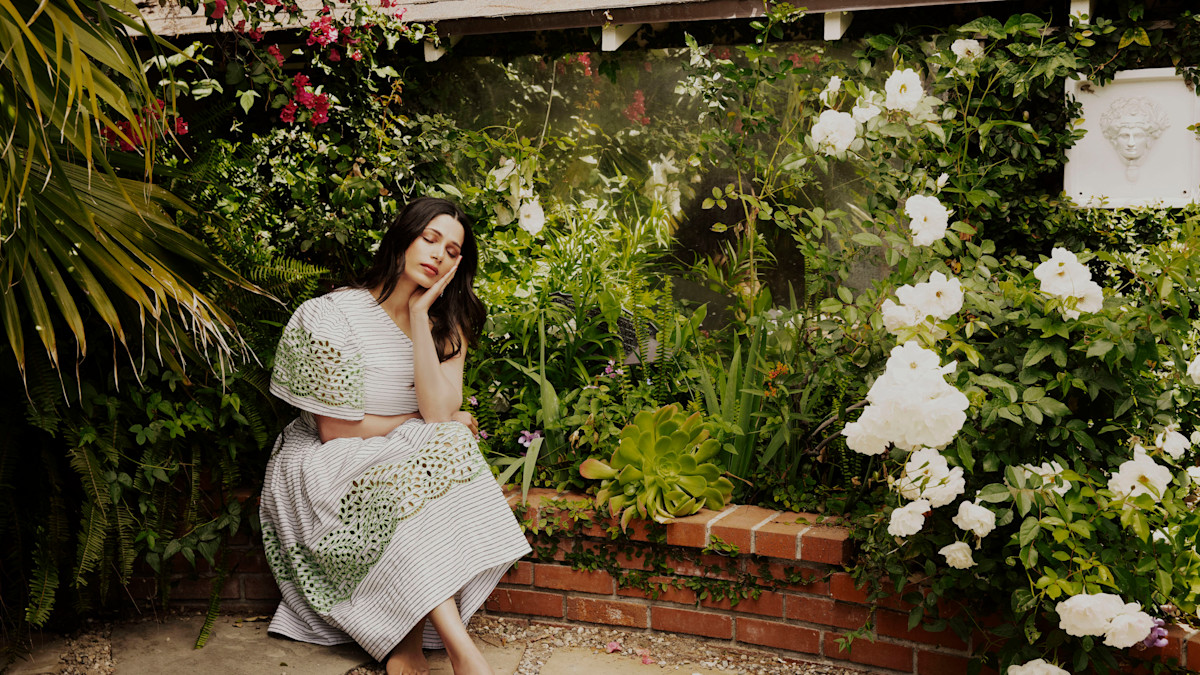
Tanya Taylor Dress.
TR: What kind of vision does director Emma Holly Jones bring to this story?
"[Emma Holly Jones'] determination to get it made, was really the thing that drew me to the project."
FP: She comes from such a wonderful background in the commercial world. She could see this film and tell the story with depths of emotion but also make it commercially fun and attractive to a whole set of audiences, across the board, all age groups, specifically women. At times as women, we don't feel like there are things that are made for us. It's just like, why am I watching this extremely violent, only-full-of-very-explicit-sex story? Seeing women being represented in their 30's in society, and their struggles in this sweeping romance, I feel it's something Emma really understood; she understood why we needed to do it this way, why it needed to be cast a certain way. It was really fun working with someone who had the right idea for it. The other thing is that her determination to get it made, was really the thing that drew me to the project.
TR: Your character Selena is mixed race in the film, Indian and white. The film portrays English society in the 1800s as a society filled with different races. What are your thoughts on that?
FP: My character is, yes. I think this is a good question. We want everyone to feel seen. Why is it that we don't see people of other races in sweeping romances, in rom-coms, in period movies? We didn't make this film because we are trying to make a point about race. We're really trying to make a point about love. We're really trying to make a point about schemes. We're really trying to make a point about the fact that people of all colors and races, all feel rejected at times. We all feel vengeful at times, and we all fall in love. That, truly, for me, is a focal point of the film. I also love the '90s rom-com so much, and, for me, Mr. Malcolm's List, is the perfect marriage and mashup of '90s rom-com meets Jane Austen.
TR: The film also centers around this strict list that Mr. Malcolm has, about who would make a perfect partner for him. What do you think about this idea of having qualifications, or a mental checklist of qualifications for what you want in a partner? How do you think that theme or idea carries today, to modern dating? What idea permeates in terms of modern dating, app dating, trying to meet one's match, and the checklists that people tend to carry with them? Are you someone who has found yourself trying to cull a checklist of your own, over the years?
"I've certainly had my own checklist, and I think it is highly important. If you are very serious about getting married, you need to know what you're looking for. You need to know what you will make do with, and you need to know what you're willing to compromise on."
FP: I've certainly had my own checklist, and I think it is highly important. If you are very serious about getting married, you need to know what you're looking for. You need to know what you will make do with, and you need to know what you're willing to compromise on. If there are to be no compromises, you need to know it. For me, it's a very practical way of finding your partner, whether it's a mental checklist, or something you write down and laminate and keep. I wrote mine on my phone in my Notes app. I had a mental checklist too. I'm happy to inform and let everyone know that Cory met all the requirements on my list! Happy to report he passed! For me, it was a very practical thing. For Julia in the film, it's the most preposterous thing ever. How dare someone reject her based on a list? It reminds me of that episode from Friends where Rachel discovers that Ross had made a list of pros and cons about her, and it really hurt. If I found out that there were mean things on a list, I would be hurt myself, but for all intents and purposes, this was a private list. No one was meant to read Mr. Malcolm's list, but it got leaked.
TR: What do you think about the way that series and film have merged?
FP: It's about time. It's been happening for a while now already. Film actors are doing TV shows, and TV actors are now getting opportunities in movies. I don't know why there should be a difference in medium. Entertainment is entertainment, and telling a story is telling a story, whether it's in a series, or in a film. I have no other answer other than, it's about time.
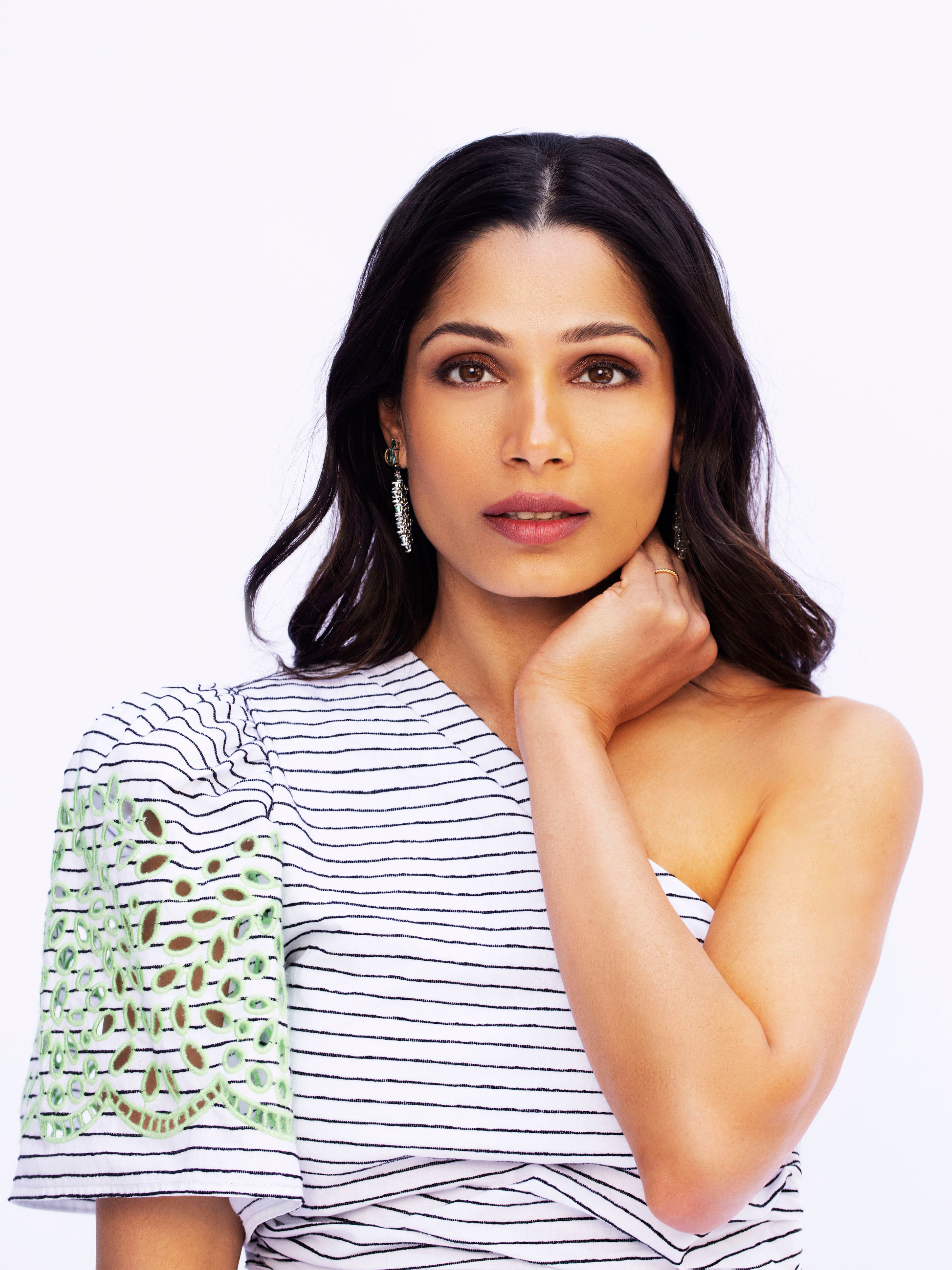
"Freida has beautiful, silky hair. I used a Hot Tools 1-Inch Curling Iron to give her hair a loose wave texture. After, I put Unite Hair Expanda Dust Volumizing Powder at the root for more over all volume and Unite Hair Texturiza Spray throughout for more texture. For our updo style, I loosely pulled back her hair into a low bun and used hair pins to secure, letting her hair fall out naturally for an effortlessly undone look." - Hair Stylist Joseph Chase
Above, Freida wears a Tanya Taylor dress and Karma El Khalil earrings.
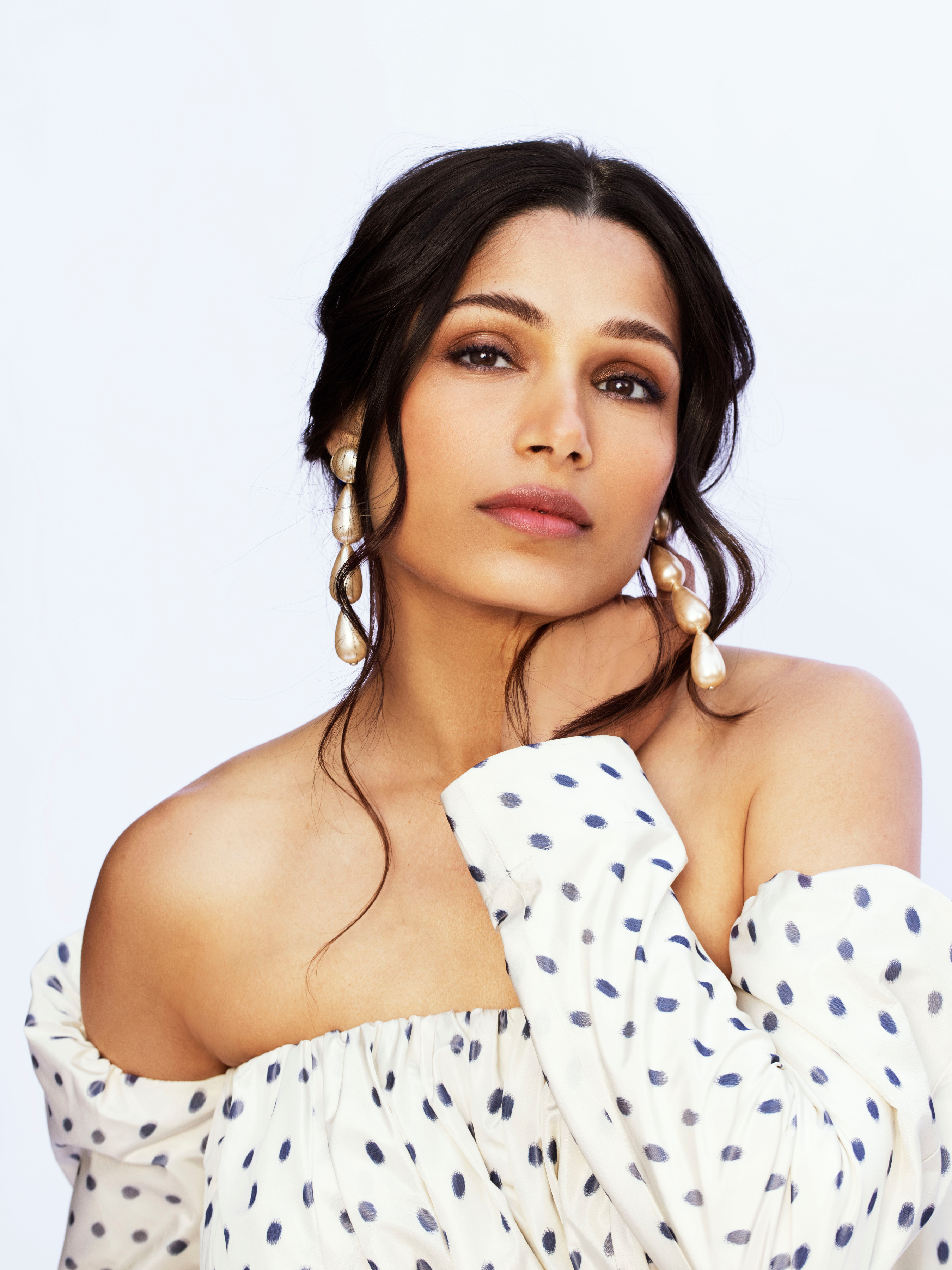
"My favorite makeup is a soft, plush look that enhances natural beauty. My main focus has always been the skin, to achieve that lit-from-within glow, without looking like the makeup is wearing you. I blended Chantecaille Cheek Gelée Gel-Cream Blush onto the apples of Freida's cheeks, and a dusting on the tip of her nose. I applied a tiny amount of Chantecaille Liquid Lumière Highlighting Fluid onto the top of her cheekbones, on the tip of her nose, and just above the cupid's bow for a gorgeous, natural glow." - Makeup Artist Lilly Keys
Above, Freida wears a One/Of dress and Florian earrings.
#BTS
JUNE 2022 COVER
FREIDA PINTO
LOCATION
LOS ANGELES, CA
PHOTOGRAPHER
MATT SAYLES
STYLIST
TAMARA RAPPA
HAIR
JOSEPH CHASE
EXCLUSIVE ARTISTS
MAKEUP
LILLY KEYS
A-FRAME AGENCY
MANICURIST
CHI PHAN
CLOUTIER REMIX
PHOTO ASSISTANT: SAMAN ASSEFI, ASSISTANT MARKET EDITOR: JARED DEPRIEST
"I absolutely love Artipoppe baby carriers. I have one in wool, which is meant for cold weather. I really enjoyed strutting it around the English countryside when it was cold."
"I have an Artipoppe carrier in cotton I love."
"My makeup artist Daniel Martin introduced me to the Tatcha Indigo Overnight Repair cream. I literally can't go to bed without it."
"I'm loving Anya Recovery Tonic. It has wonderful ingredients that really help keep the immune system boosted, specifically vitamin C."
"I love using the Huckleberry App. I love knowing what's going on with Rumi's naps, playtime, feeding, and whatnot. Friends, family, and his caregivers have committed to putting information on the app so I can check it wherever I am."
"I absolutely love my Frēda Salvador shoes. They just get better with time. I particularly love the Brooke Rain Boots."
"Frēda Salvador Libby D'orsay sneakers are so comfortable, I love them."
"I'm in my postpartum recovery period, so I'm obsessed and committed to yoga. Traveling with my yoga mat, blocks, and yoga strap is super important as I'm trying to heal my body, and gain pelvic floor strength."
"I am obsessed with cute baby clothes from organic brands like MakeMake Organics, Colored Organics, and PEHR."
"I am obsessed with cute baby clothes from organic brands like MakeMake Organics, Colored Organics, and PEHR."
"I am obsessed with cute baby clothes from organic brands like MakeMake Organics, Colored Organics, and PEHR."
